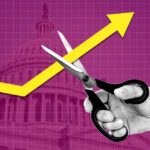A new survey from the American Institute of CPAs (AICPA), conducted by The Harris Poll, reveals a troubling gap in Americans’ financial readiness for natural disasters. According to the findings, 32% of Americans have not taken any financial steps to prepare for a disaster, despite the fact that two-thirds say such an event would negatively impact their finances.
While 66% of respondents said a natural disaster would either have a major or moderate impact on their financial situation, only 31% of respondents to the survey conducted have actually reviewed their insurance coverage, and just 30% have taken inventory of their belongings for insurance purposes. Fewer than one in five (19%) have proactively created or updated an estate plan or will, making that statistic one of the lowest reported actions in the survey.
“Many Americans don’t think about their finances when it comes to preparation for a natural disaster,” said Eva Simpson, CPA and AICPA VP of Member Value, Tax, and Advisory Services. “However, financial needs become front and center after the destruction has already taken place.”
The survey also looked at small business owners, many of whom expressed concern over the risks natural disasters pose to their operations. Sixty-three percent of business owners said they were concerned about financial hardship if they experienced losses due to a disaster. The top concerns included revenue loss from closures (33%), losing customers or contracts (29%), and property damage (26%).
To help both individuals and business owners better prepare, AICPA offered several practical steps. For individuals, these include creating an emergency fund, reviewing insurance coverage, safeguarding important documents, and preparing or updating an estate plan. The organization recommends storing vital records, such as insurance policies, wills, property deeds, and identification, in a fire- and water-resistant safe or safety deposit box.
For businesses, the advice includes establishing backup communication systems, preparing for remote work, securing data through off-site backups, and having contingency plans for workspace disruption.
“Preparing financially for a disaster is a challenging, but necessary, task for individuals, families and business owners,” advised Simpson. “Disasters can take a toll both emotionally and financially–taking these steps to prepare can provide peace of mind and help victims rebuild after a tragedy.”






